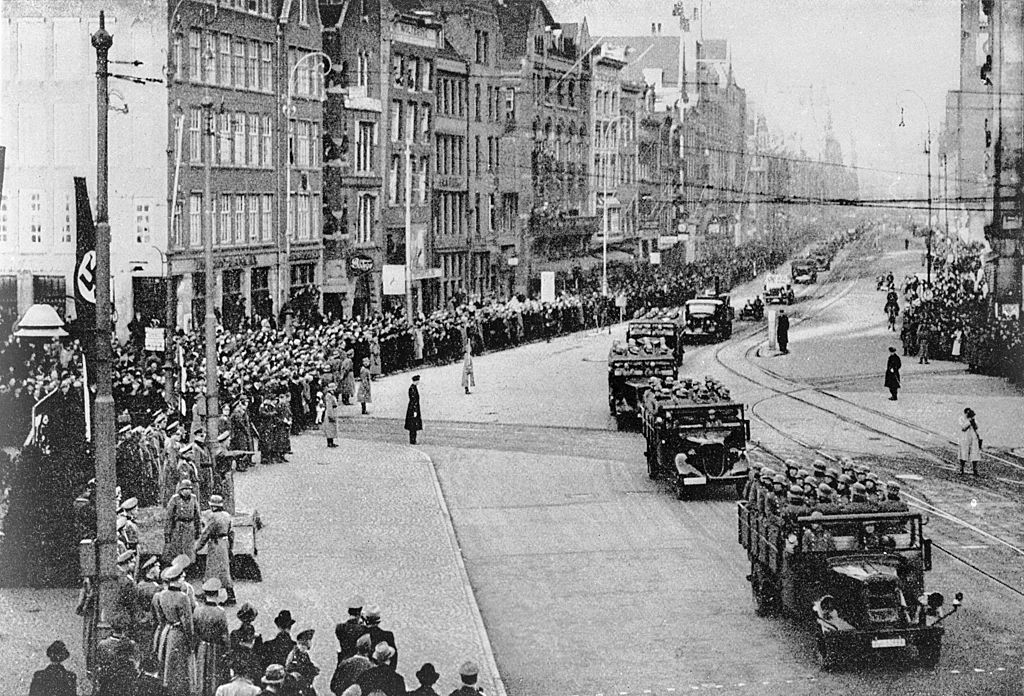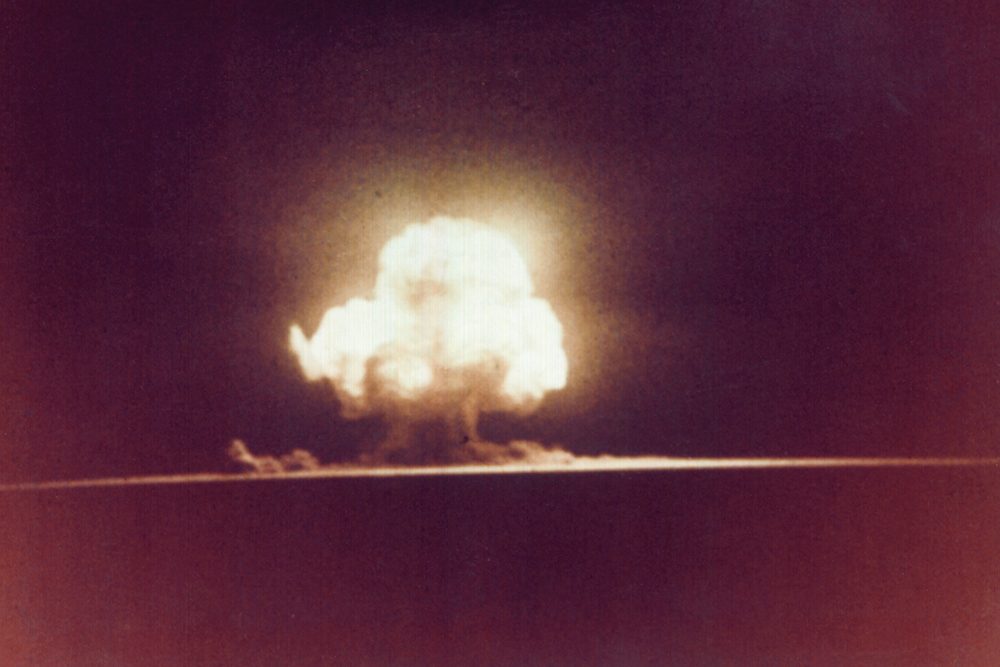After Nazi Germany attacked the USSR, Winston Churchill had no qualms about entering into an alliance with Stalin, whose regime he understood all too well: “If Hitler invaded Hell, I would make at least a favorable reference to the Devil in the House of Commons.”
Similar thinking does much to explain the enlistment of former (and not so former) Nazis by the Western allies in intelligence work against the Soviets after 1945. With the Red Army in the heart of Europe, co-opting suitably qualified veterans of the fallen Reich — some of whom had very dirty hands indeed — made some sense, according to that Churchillian logic, but mainly when those selected were anti-Communist and now aligned with a democratic Germany. Danny Orbach explains in Fugitives, however, that too many failed that test, particularly the individuals who joined or worked with nascent Western German intelligence outfits.
Some clung to National Socialism or were so consumed by hatred of the West as to render them effectively pro-Soviet. Others wanted a Germany free from both blocs or remained driven by antisemitism: an obsession that turned them against the West, and, in certain cases, toward the Arab world. Still others had abandoned ideology, becoming “greedy adventurers and professional con men,” often selling “intelligence” of the lowest quality to the highest bidder. In the war’s aftermath, the absence of an appropriate filtering process when looking for new recruits was partially excusable, but the fact that, if anything, standards were relaxed further in subsequent years — a development that, in the case of the leading West German agency, helped give birth to the fiascos that make up a good portion of this book — was not.
It should be added that some freshly hired operatives had behaved with such depravity during the war, even by Nazi standards, that enlisting them suggested a morality gone hopelessly askew. Klaus Barbie, the notorious Butcher of Lyon, surely cannot have been that valuable to American intelligence.
Fugitives is impressively researched, and it shows, if rather exhaustingly and sometimes bewilderingly so. I found myself flipping backwards to remind myself which ex- (or not) Nazi Orbach was writing about. Many crop up again and again. Here’s Wilhelm Beisner peddling intelligence and trafficking arms. And here’s Beisner again, working for the Egyptians. Over the years, Beisner was associated with more than one West German intelligence agency, not that that stopped the French from blowing him up (for supplying weapons to Algerian insurgents): he lost a leg and was almost blinded.
The tales Orbach tells could fit into a peculiarly cynical 1970s spy novel, and it can read like one too (“compromised agents infested GV-L like maggots in spoiled meat”). It is a murky saga of espionage, paranoia, and betrayal, of double agents, charlatans, covert arms deals, killings, fugitive war criminals, Nazis in high places, all manner of sleaze, and endlessly shifting allegiances, although “allegiances” may imply too high a level of commitment. One not-so-former Nazi intelligence official worked for the Americans, the French, the Yugoslavs, the Soviets, Arab agencies and Jewish organizations, not always at different times.
Structurally, Fugitives primarily consists of two overlapping narratives. The first revolves around Reinhard Gehlen, a former general who ran an agency responsible for intelligence analysis on the Eastern Front. With his credibility boosted by an extensive archive on the Red Army, and his team’s expertise, he impressed the Americans enough for them to underwrite what became known as the “Gehlen Org” as an independent intelligence operation under their tutelage.
To Gehlen’s annoyance, his was not the only — in Orbach’s words —“espionage racket” that Washington sponsored. But, in the end, it saw off its competitors, and in 1956 was handed over to West Germany by the CIA, and transformed into the BND, the Federal Republic’s foreign intelligence service. Gehlen had his successes, but his organization was plagued by chaotic man- agement, corruption, cronyism and, even after it had become an agency of the West German state, horribly flawed recruitment. This was a gift to Eastern bloc propagandists, even though Moscow also worked with its erstwhile Nazi foes. It was also an invitation to penetration by the Soviets, which they eagerly accepted, with immensely damaging consequences.
The second of these narratives is principally focused on the efforts of the embryonic West German intelligence services to gain a foothold in the Middle East, a presumptuous move given that Germany was still occupied at the time. Orbach attributes this to “a combination of economic concerns, a residual desire to play a role on the global stage, and private empire building by Gehlen Org operatives.” There were old connections in the region that could be — and were — reactivated, something that the ubiquitous Beisner was well-placed to do. He had headed the Arab section in the SS’s foreign intelligence service. The presence of German communities in Damascus and Cairo, possibly somewhat swollen since 1945, did not hurt.
Germany’s relaunched intelligence operations in the area were a mess (and, as a Cold War gambit, ultimately a failure) marked by a willingness to work, directly or indirectly, with former Nazis of rock-bottom trustworthiness. These spooks might also have been employed by local strongmen for whom a record of antisemitic savagery was not exactly a blot on a résumé.
The later decision by Gehlen and the BND to arrange arms-smuggling through proxies to Algerian rebels against France in an endeavor, Orbach writes, “to push the Soviets and East Germans out of the North African sphere,” not only backfired, but risked alienating Paris at a time when rapprochement with France was central to West German foreign policy. Fortunately for Bonn, the French largely contented themselves with the assassination or attempted assassination of Beisner and a number of the other German arms dealers.
Much of the rest of the book is taken up with stories connected, one way or another, to these earlier narratives. One involves the monstrous Syrian career of Alois Brunner, Adolf Eichmann’s right-hand man, and another describes Egypt’s recruitment of German scientists to rejuvenate its missile program. The scientists were mediocre, and the whole project was a shambles, but the Israelis were panicked into overreaction, which would eventually cause serious diplomatic problems with both the US and West Germany and a domestic political crisis. Orbach relates how ferocious rhetoric emerging from Egypt tied into “memories of the Holocaust, and the fact that the rocket scientists were German merged the images of the “‘old’ German Nazi and the ‘new’ Arab Nazi into an omnipotent demon.”
Running through this book is a pair of illusions that allowed some of the characters in Fugitives to forge the dismayingly consequential post-war careers that they did. The first was that of ideological reliability. The second was that achieving a degree of seniority under the Nazis was, if nothing else, a guarantee of competence at something other than mass murder, an assumption that said more about the mystique that still attached to the defeated Reich than about the talents of at least some of Orbach’s cast.
That a critical element in the successful construction of West Germany was the reintegration of millions of former Parteigenossen into the country’s young democracy is no secret, and nor are the disturbingly wide-ranging amnesties for Nazi-era crimes that accompanied it. But one of many unsettling subtexts here is the extent to which, far beyond any bleak Cold War necessity, that reintegration was based not only on official amnesia about past atrocity, but also on a chilling indifference to what had occurred: an indifference that, not infrequently, masked something far worse.
This article was originally published in The Spectator’s March 2022 World edition.

























